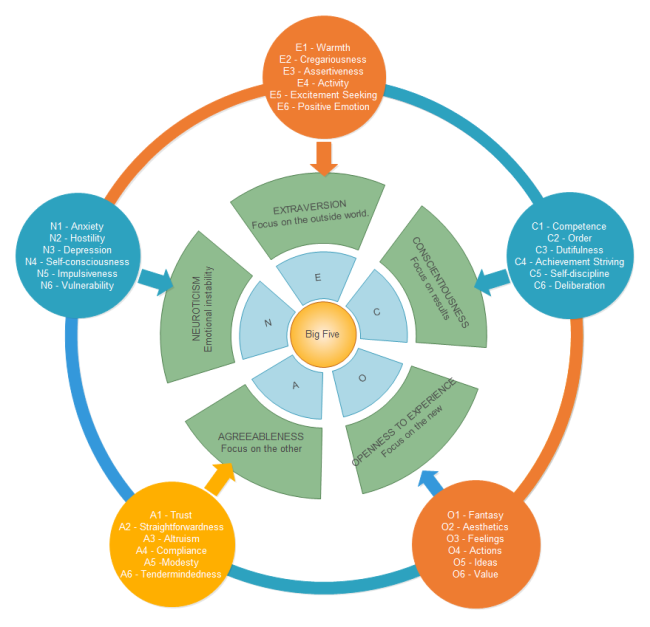Circular Diagram - Big Five Personality Dimensions
Overview of Big Five Personality Dimensions
There are many models for personality analysis. The Big Five Dimension model is also widely used. It can be summarized as follows:
Neuroticism - A tendency to easily experience unpleasant emotions such as anxiety, hostility, depression or vulnerability.
Extraversion - This basically defines how one express oneself - like being talkative, outgoing or reserved. Those who are on the higher end of this trait are extroverts and those who are on the opposite end are introverts.
Agreeableness - Characterized by a tendency to be compassionate and cooperative rather than suspicious and antagonistic towards others.
Conscientiousness - Defines one's levels of thoughtfulness. How efficient or self-disciplined a person is vs. being careless. How goal-oriented an individual is. Meticulously planning, being detail-oriented are some of the features that define this trait. Basically perfectionists vs. a very clumsy person fall on opposites of the conscientiousness grid.
Openness to experience - Appreciation for art, emotion, adventure, and unusual ideas; imaginative and curious.
These traits are usually measured as percentile scores, with the average mark at 50%. For instance, a Conscientiousness rating in the 80% means a greater than average sense of responsibility and orderliness, while an Extroversion rating in the 5th percentile indicates an exceptional need for solitude and quiet.
Obviously each of us has these traits at varying amounts and the quantity of each of these traits defines each one of us uniquely. This method may be a good predictor of many real-world behaviors which could aid in choosingajob,findingouthowhealthyyouareorwillbeinthefuture,orhowwellyouareableto
Demerits of the Big Five Models
We must bear in mind that personality is extremely complex and will vary from person to person across these five dimensions. Also it is not one-size-fits-all approach. In different cultures, additional or different dimensions may be used when analyzing personality. A typical example of how these dimensions are relevant to our personality across cultures is individualism-collectivism. In the United States, people fall into the individualistic category which says we focus on ourselves compared to a collectivist culture, like Asian countries, which will focus on relations with others.
Circular Diagram of Big Five Personality Dimensions

Vector smart shapes with floating quick buttons are used in this diagram. It is editable and printable. You can transfer it into many other formats including PowerPoint, PDF and JPG. By applying another theme, its looks change at one click.
Video Tutorial - How to Create a Circular Diagram


